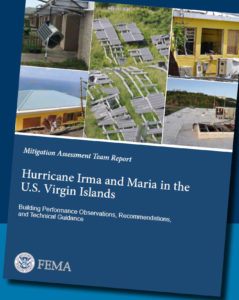
Resilience begins with mitigation
 On Sept. 7, 2017, Hurricane Irma devastated much of St. Thomas and St. John in the U.S. Virgin Islands (USVI). Two weeks later, Hurricane Maria further damaged the islands as it passed directly by St. Croix, the base of operations for the Hurricane Irma recovery. Much of the damage from the storms was from wind-driven rain, localized ponding and site-specific storm water runoff.
On Sept. 7, 2017, Hurricane Irma devastated much of St. Thomas and St. John in the U.S. Virgin Islands (USVI). Two weeks later, Hurricane Maria further damaged the islands as it passed directly by St. Croix, the base of operations for the Hurricane Irma recovery. Much of the damage from the storms was from wind-driven rain, localized ponding and site-specific storm water runoff.
Following a request for technical support, the Federal Emergency Management Agency (FEMA) deployed a Mitigation Assessment Team (MAT) composed of national and regional experts to affected areas in the U.S. Virgin Islands. The MAT’s final report — FEMA P-2021 | Mitigation Assessment Team Report: Hurricanes Irma and Maria in the U.S. Virgin Islands — issued earlier this fall made the following observations and recommendations:
- To improve the application of the latest International Codes practices, the MAT recommends strengthened design procedures, increased enforcement staffing, renewed enforcement of common oversights and additional training for code officials.
- For residential buildings, the MAT recommends methods for managing water intrusion and improving roof performance.
- For critical infrastructure, the MAT recommends vulnerability assessments of roof coverings and rooftop equipment and, where a new roof is required, that roof coverings be designed to resist high winds in accordance with the most current design standards.
- The MAT recommends that International Code Council (ICC)-rated storm shelters be required in select circumstances.
- Following damage to ground-mounted solar panel systems, the MAT recommends that new design standards be developed for these systems for both the International Codes and the USVI Building Code.
- The MAT recommends that revised basic wind speed maps for the U.S. Virgin Islands consider topographic effects, which are not currently modeled.
Related:
Volunteers needed for important building code mission
FEMA releases 2017 hurricane report
Following the 2017 hurricanes, the Code Council donated 2018 International Code books to the U.S. Virgin Islands to aid in recovery projects. The Code Council also coordinated with FEMA and the Department of Planning and Natural Resources in the U.S. Virgin Islands to recruit ICC-certified building professionals to assist in the assessment of buildings impacted by hurricanes Maria and Irma, and has also provided training to the U.S. Virgin Islands.
As of March 1, 2018, the U.S. Virgin Islands have adopted the 2018 International Codes. The Federal Emergency Management Agency has also awarded the islands a Hazard Mitigation Grant, which provides support to the U.S. Virgin Islands over six years to create a Building and Floodplain Enforcement Unit to ensure that the building stock under repair, and new construction, complies with the National Flood Insurance Program and the 2018 International Codes. The Department of Planning and Natural Resources will use these funds to increase staffing, boost training and install a new electronic permitting system.








